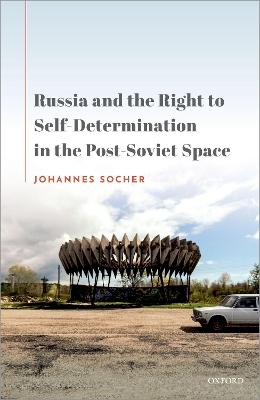
Russia and the Right to Self-Determination in the Post-Soviet Space
Oxford University Press (Verlag)
978-0-19-289717-6 (ISBN)
The right to self-determination is renowned for its lack of clear interpretation. Broadly speaking, one can differentiate between a 'classic' and a 'romantic' tradition. In modern international law, the balance between these two opposing traditions is sought in an attempt to contain or 'domesticate' the romantic version by limiting it to 'abnormal' situations, that is cases of 'alien subjugation, domination and exploitation'.
This book situates Russia's engagement with the right to self-determination in this debate. It shows that Russia follows a distinct approach to self-determination that diverges significantly from the consensus view in international state practice and scholarship, partly due to a lasting legacy of the former Soviet doctrine of international law. Against the background of the Soviet Union's role in the evolution of the right to self-determination, the bulk of the study analyses Russia's relevant state practice in the post-Soviet space through the prisms of sovereignty, secession, and annexation. Drawing on analysis of all seven major secessionist conflicts in the former Soviet space and a detailed study of Russian sources and scholarship, it traces how Russian engagement with self-determination has changed over the past three decades. Ultimately, the book argues that Russia's approach to the right of peoples to self-determination should not only be understood in terms of power politics disguised as legal rhetoric but in terms of a continuously assumed regional hegemony and exceptionalism, based on balance-of-power considerations.
Johannes Socher is a postdoctoral research fellow at Freie Universität Berlin and is currently seconded to the German Federal Foreign Office as an academic adviser on rule of law assistance. Previously, he was a research fellow at the Max Planck Foundation for International Peace and the Rule of Law and at the German Research Institute for Public Administration. He has two state examinations in German law, an M.Sc. in Law, Anthropology and Society from the London School of Economics and Political Science, and an LL.M. as well as a Ph.D. in law from the German University of Administrative Sciences.
INTRODUCTION
CHAPTER 1 THE SOVIET DOCTRINE ON THE RIGHT TO SELF-DETERMINATION REVISITED
1. Political and Ideological Foundations
2. The Soviet Contribution to the Codification of Self-determination
3. The Modifications in the Soviet Sphere of Influence
4. The Right to Self-determination in Soviet Scholarship
5. Conclusions
CHAPTER 2 RUSSIA, THE RIGHT TO SELF-DETERMINATION AND SOVEREIGNTY
1. The Balance in the Russian Constitution
2. Case Study 1: Tatarstan
3. Case Study 2: Chechnya
4. Conclusions
CHAPTER 3 RUSSIA, THE RIGHT TO SELF-DETERMINATION AND SECESSION
1. Russia's Position in the Kosovo Case
2. Case Study 3: Nagorno-Karabakh
3. Case Study 4: Transnistria
4. Case Study 5: South Ossetia
5. Case Study 6: Abkhazia
6. Conclusions
CHAPTER 4 RUSSIA, THE RIGHT TO SELF-DETERMINATION AND ANNEXATION
1. Russia's Retrospective View on the Baltic States' Annexation in 1940
2. Case Study 7: Crimea
3. Conclusions
CHAPTER 5 POST-SOVIET RUSSIAN SCHOLARSHIP ON SELF-DETERMINATION
1. Post-Soviet Scholarship of International Law in Russia: An Overview
2. Self-determination in Post-Soviet Russian Scholarship
3. Positions on 'Crimea' in Russian Scholarship
4. Conclusions
Final Conclusions
Acknowledgments
Bibliography
Index
| Erscheinungsdatum | 19.08.2021 |
|---|---|
| Verlagsort | Oxford |
| Sprache | englisch |
| Maße | 162 x 241 mm |
| Gewicht | 578 g |
| Themenwelt | Recht / Steuern ► EU / Internationales Recht |
| Recht / Steuern ► Öffentliches Recht ► Verfassungsrecht | |
| ISBN-10 | 0-19-289717-9 / 0192897179 |
| ISBN-13 | 978-0-19-289717-6 / 9780192897176 |
| Zustand | Neuware |
| Haben Sie eine Frage zum Produkt? |
aus dem Bereich


